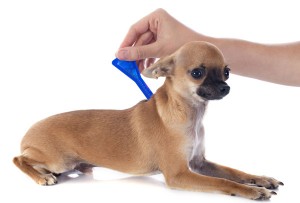Fleas
Fleas are most often seen during the warmer months but as we keep our homes nice and warm throughout winter, we see fleas all year round.
 Only a small part of the adult flea population actually lives on your pet. The fleas’ eggs and larvae live in the environment and can survive for up to a year, so it is important to not only treat your pet directly for fleas but also decontaminate the environment as well. Wash your pets bedding using the hottest cycle and regularly vacuum/clean carpets. We do not recommend flea collars or flea shampoos alone as they fail to address the environmental flea infestation.
Only a small part of the adult flea population actually lives on your pet. The fleas’ eggs and larvae live in the environment and can survive for up to a year, so it is important to not only treat your pet directly for fleas but also decontaminate the environment as well. Wash your pets bedding using the hottest cycle and regularly vacuum/clean carpets. We do not recommend flea collars or flea shampoos alone as they fail to address the environmental flea infestation.
Fleas will tend to jump onto your pet only to feed and then jump off again. Dogs and cats can have a reaction to flea saliva resulting in a skin condition called Flea Allergy Dermatitis or FAD. Treatment of FAD can be complicated and veterinary consultation is recommended.
Some signs that your pet may have fleas include:
- Scratching, biting and hair loss, especially at the base of the tail and rump
- You may see fleas (especially over the rump and in the groin region)
- It can be difficult to find the fleas, but is relatively easy to check for flea dirt. Simply moisten a cotton ball, part your pet’s fur and place the cotton ball on the skin over the rump. If the cotton ball takes on black specs surrounded by a reddish area, this may be flea dirt and can indicate that your pet has fleas.
Warning: Some non-veterinary brands of flea treatments for dogs are potentially lethal when applied to cats. Always seek veterinary advice about the best flea treatments for your pet.
Please call us to discuss an appropriate flea control program for your pet.
Ticks
Ticks are more than just a pest that irritates your cat or dog. Some can cause terrible illness and transfer blood borne diseases.
Brown dog ticks, bush ticks and kangaroo ticks can be found in bush-land and in parks where dogs enjoy playing. Checking your pet regularly and having them on a tick preventative is the best way to keep your pet safe from these parasites. If you are not confident removing the tick please call us immediately to make an appointment to have it removed.
Contact our friendly staff at Mt Helena Vet to further discuss which treatment is best for your pet, please call us to discuss.
